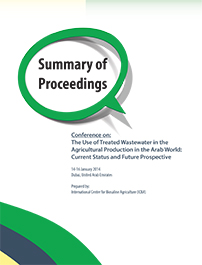Use of Treated Wastewater in Agricultural Production in Arab World: Current Status and Future Prospective
This report provides a brief summary of the proceedings and recommendations of the "Use of Treated Wastewater in Agricultural Production in the Arab World: Current Status and Future Prospective" conference , held in Dubai during January 2014 under the patronage of H. H. Sheikh Hamdan Bin Rashid Al Maktoum, Deputy Ruler of Dubai and Minister of Finance.
During the conference 120 experts from the Arab region together with leading international experts shared global, regional and local experiences and lessons learned regarding the use of wastewater (WW) and treated wastewater (TWW) for agricultural production. Participants were divided in three Working Groups (WGs) that discussed: current knowledge, gaps and future directions in the use of TWW in agricultural production; regulations and strategic planning; and, existing partnerships, regional cooperation and future opportunities. They identified the existing gaps and key future needs. The findings and recommendations presented in this summary report are based on the presentations and discussions during the conference and should be seen as a starting point for needed fut ure interventions to further promote and expand the use of WW and TWW not only in the Middle East and North Africa (MENA) region , but globally.
Although indirect WW reuse has been going on throughout history, the past few decades witnessed the spread of formal and planned WW and TWW reuse for agricultural production. This growing trend of planned reuse enables governments and stakeholders to mitigate the environmental and health hazards associated with the reuse of WW. The MENA region includes many countries reusing both WW and TWW for agricultural production, and the trend is expanding with TWW now included in the water budget of several Arab countries.
Public perceptions towards TWW reuse, and farmers concerns and unwillingness to switch from irrigating with "free" fresh groundwater resources were cited as key challenges that need to be addressed. Lack of knowledge about the risks , and lack of trust in authorities were identified as main reasons contributing to the resistance of farmers and the public. Nevertheless, experience in many Arab countries demonstrated that severe water scarcity greatly facilitates farmers' acceptance and usage of TWW and even WW.
As water becomes scarcer in the Arab region, reuse of WW will no longer be an option but a necessity, accordingly there is a need to: examine the benefits and costs of WW reuse and build future expansion programs based on the results of these socio - economic - health analysis; develop comprehensive management practices and tools for irrigation with WW and TWW to minimize risk and hazards; establish national and regional TWW reuse monitoring systems; develop national and regional laws, regulations and standards pertaining to TWW reuse. Concurrently, there is a need to establish accountable institutes within the countries of the region that are responsible for monitoring and enforcement to ensure the highest standards of health and safety . Additionally, there is a need for a regional platform that leads these efforts and acts as a facilitator that brings together institutions and experts to share results, information, lessons learned, and best practices.











